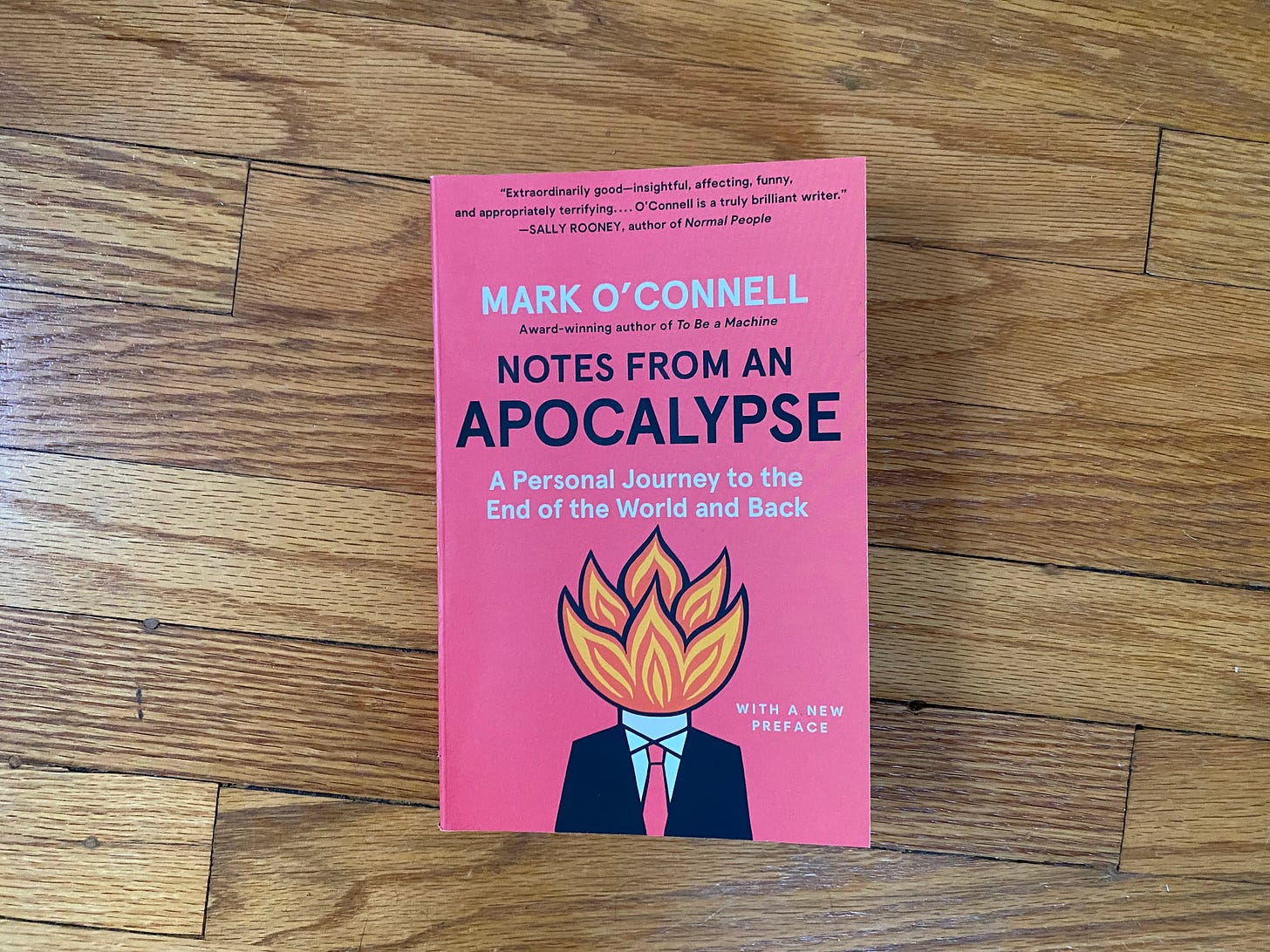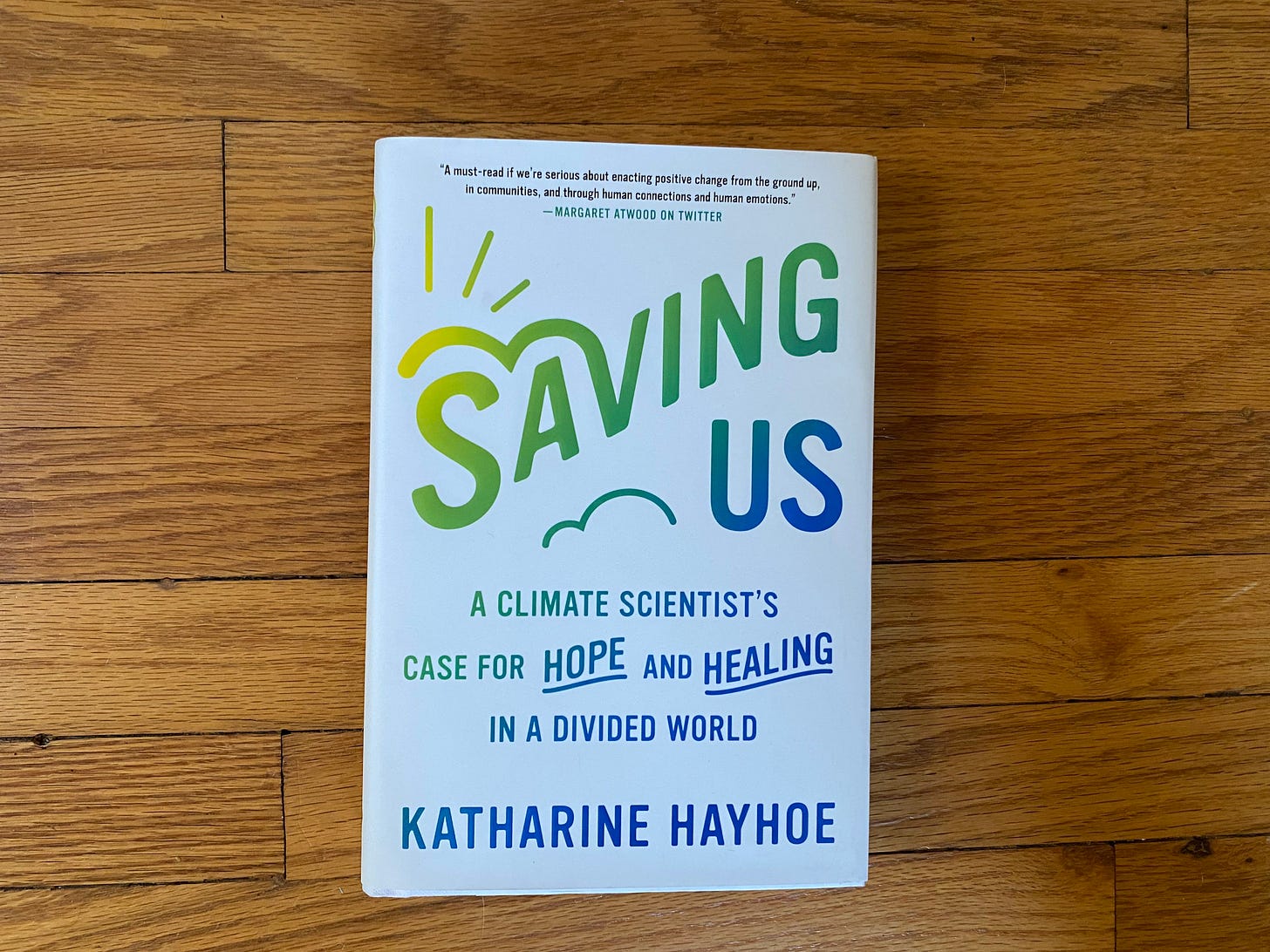Some Climate and Apocalypse-Related Reading Material
Wherein you get to read about what this project has me reading
This project has caused me to read quite a lot this past year. I’ve been consuming more climate change-related podcasts and articles and books than I have in the last few years combined. And now, you get to benefit from this mass consumption of reading and listening materials. Hooray.
So let’s get into three of said reading materials in case you would also like to read along with me.
These books are extremely different from one another, yet there is a tie. They are all related in some way to one kind of apocalypse or another. Although I admit that Katharine Hayhoe might take issue with my casting her wonderfully hopeful book as being about “the apocalypse” because it sounds like I’m just giving up on the world. But if we look at the Greek roots of the word, apokálupsis, actually means “revelation,” or “to reveal,” there is quite clearly a revelation that is happening as our climate changes and it’s our choice to make something good (or bad) out of the moment.
“Apocalypse” has come to mean the end of times, but perhaps there’s something hopeful in the idea of apocalypse. And all of these books have some of that hope (some more than others, of course) within that context of The Apocalypse.
A note, I’m also hosting a book club where, together, we are reading books like this along with fiction books that are dealing with the ideas I’m working through in this project. We’re calling it the Futurist Book Club. If you’re interested in joining this group, drop a comment below and I’ll follow up!
A Paradise Built in Hell by Rebecca Solnit
What if disaster communities held the keys to a thriving and interconnected society? That’s the question that drives much of this book. Solnit goes into detail about some of the most terrible disasters in the United States bringing to the fore stories of hope and humanity. From the 1906 San Francisco earthquake to the aftermath of Hurricane Katrina in New Orleans, she walks us through various disasters shedding light on examples of mutual aid and compassion and heroic feats. She shows how small societies that have organized themselves in ways that seem so much like a utopia.
Of course, these disasters were awful events that, as catastrophes do, killed and injured a whole lot of people. The horror cannot be avoided or glossed over, but it’s also what the media tends to focus on after a disaster. Solnit seeks to find the glimmers of hope, the shining examples of what our society can be.
“In [disasters], strangers become friends and collaborators, goods are shared freely, people improvise new roles for themselves,” she writes. “Imagine a society where money plays little or no role, where people rescue each other and then care for each other, where food is given away, where life is mostly out of doors in public, where the old divides between people seem to have fallen away, and the fate that faces them, no matter how grim, is far less so for being shared, where much once considered impossible, both good and bad, is now possible or present, and where the moment is so pressing that old complaints and worries fall away, where people feel important, purposeful, at the center of the world.”
It is, as I’m sure Solnit would describe it, an apocalypse that reveals the humanity within each of us.
Notes from an Apocalypse by Mark O’Connell
On the other side of this hopeful coin are, of course, the doomsday preppers. Mark O’Connell’s journey is all about these preppers, particularly the very wealthy White men who, as O’Connell sees it, are preparing for their end-time fantasies by building apocalypse bunkers in New Zealand and South Dakota and creating plans to colonize Mars.
I wrote about a conversation O’Connell had on the podcast Wild with Sarah Wilson and the wild West fantasies these survivalists are attempting to manifest through their projects. The book dives even deeper into that, and even more so O’Connell’s personal journey. He embarked upon his book at a time when he was feeling deep climate grief and it seemed so similar to the journey I’m on except he took kind of the opposite track looking to the most extreme doomsday preppers. A self-described socialist, O’Connell’s views run counter to those of these individualist bunker-builders and his journey, interestingly, brought out similar realizations I’m having about the need for us to run away from the hyper-masculine, wild West fantasy of the apocalypse and rather to move toward valuing community and care and connectedness.
Saving Us by Katharine Hayhoe
This is one of those books that I’ve just been recommending to everyone with whom I speak. Seriously have mentioned it to about 5 people in the last week…and now I’m mentioning it to you, dear readers.
As a climate scientist and climate communicator, Hayhoe has cracked some sort of code on how to relate to people about the issue of climate change. She believes that the only way we're going to get ourselves out of this mess is if we all band together to create change. And by all, she means it. While the climate deniers are largely going to remain in that denial space (she recommends not to touch on it with the most staunch), there are many others who are more open than you would think if you could just connect with them on the issue on their terms. And they are as important to the equation of making change as anyone else.
I found this book so wonderfully hopeful through her acknowledgment of all of our humanness. Because even those of us doing what we think we can for the planet, we can all get caught up in the inaction cycles and can be deterred from action by the same kind of dire warnings we’ve been getting for years. Her recommendations serve as a guide on how we can work on coming together to make change.
“The bottom line is this,” she says. “To care about climate change, you only need to be one thing, and that’s a person living on planet Earth who wants a better future. Chances are, you’re already that person—and so is everyone else you know.”
More recommendations to come in future newsletters. Trust me, you’re going to love the science fiction books I’ve been reading. And drop a note in the comments if you’d like to join the futurist book club!






Hello! I recently started following you on Instagram (can’t remember how I found you🤔) and am interested in joining your book club. :) I’m a huge fan of sci-fi, too!